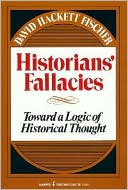 David Hackett Fischer. Historians’ Fallacies: Toward a Logic of Historical Thought. New York: Harper & Row, 1970. xxii + 338 pp. [Cf. previous post.]
David Hackett Fischer. Historians’ Fallacies: Toward a Logic of Historical Thought. New York: Harper & Row, 1970. xxii + 338 pp. [Cf. previous post.]
This excerpt from chapter 1, “Fallacies of Question-Framing,” argues that the question “Why?” is often imprecise (pp. 12–14, numbering added):
The fallacy of metaphysical questions is an attempt to resolve a nonempirical problem by empirical means. . . .
Some historians of a humanist bent will protest that all historical problems are metaphysical problems. This is humbug. . . .
These are urgent questions, and they are empirical questions, which can be put to the test. The reader will note that none of them are “why” questions. In my opinion—and I may be a minority of one—that favorite adverb of historians should be consigned to the semantical rubbish heap. A “why” question tends to become a metaphysical question. It is also an imprecise question, for the adverb “why” is slippery and difficult to define.
- Sometimes it seeks a cause,
- sometimes a motive,
- sometimes a reason,
- sometimes a description,
- sometimes a process,
- sometimes a purpose,
- sometimes a justification.
A “why” question lacks direction and clarity; it dissipates a historian’s energy and interests. “Why did the Civil War happen?” “Why was Lincoln shot?” A working historian receives no clear signals from these woolly interrogatories as to [Read more…] about Why?